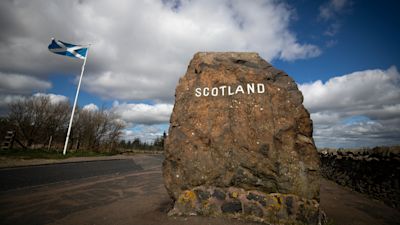Ban on cross border non-essential travel becomes law - but what are the exceptions?

It is now an illegal offence to travel over the border between Scotland and England for non-essential purposes.
It is also illegal to travel from Dumfries and Galloway and the Borders into other Scottish council areas which are under Level 3 or 4 restrictions.
The travel restrictions, which include travelling to other parts of the UK, are enshrined by law and Nicola Sturgeon urged people to abide by the new regulations.
People who violate the rules could be fined £60 unless a “reasonable excuse” such as caring responsibilities, hospital appointments or exercise.
During her daily briefings, the First Minster said: “These travel restrictions – nobody likes them, I don’t like them – but they are vital in helping us minimise these risks.
“They are vital in helping us avoid having the whole country in the same level or restrictions.
“It is these travel restrictions that mean that even although the central belt has to be in Level 4, we can avoid the Highlands or Edinburgh or parts of the country with lower prevalence being in Level 4 too.”
What is classed as essential travel?
travel for work, or provide voluntary or charitable services, but only where that cannot be done from your home
travel to school, college, or university where teaching is not provided remotely
(To and from Level 3 areas but not Level 4) travel for under 18s sport
travel for essential shopping only where it is not possible in your local authority area – you should use on-line shopping or shops, banks and other services in your local area wherever you can
travel for healthcare, social care, childcare and other essential services, including recycling, but only if they are not available in your local area
travel to provide care or assistance to a vulnerable person
travel to visit a person receiving treatment in a hospital, staying in a hospice or care home, or to accompany a pregnant woman, vulnerable person or child to a medical appointment
travel for shared parenting or travel between the two parts of an extended household
travel to meet a legal obligation, including attending court or satisfying bail conditions, or to participate in legal proceedings
travel for essential animal welfare reasons, such as feeding a horse or going to a vet
local outdoor informal exercise such as walking, cycling, golf, or running (in groups of up to 6 people from no more than 2 households) that starts and finishes at the same place
travel locally (within around 5 miles of your local authority area) to reach a place to take exercise outdoors
travel for weddings, civil partnership registrations, funerals and other “life events” (such as bar mitzvahs and christenings)
if you are a minister of religion or worship leader travel to your place of worship (to or from Level 3 areas, but not Level 4) travel to your normal place of worship
travel to give blood at a Scottish National Blood Transfusion Service collection session
travel to transit through Level 3 and 4 areas by road or public transport if your journey begins and ends outside such an area
travel to move house
travel to avoid injury, illness or to escape a risk of harm
Meanwhile, a Tory MSP has left the front bench after he defied the party whip and voted against new coronavirus travel restrictions.
Oliver Mundell, who served as rural economy and tourism spokesman for the party since Douglas Ross took over, said he could not vote to support travel restrictions which he believes will impact the ability of his constituents in Dumfriesshire to cross the border.